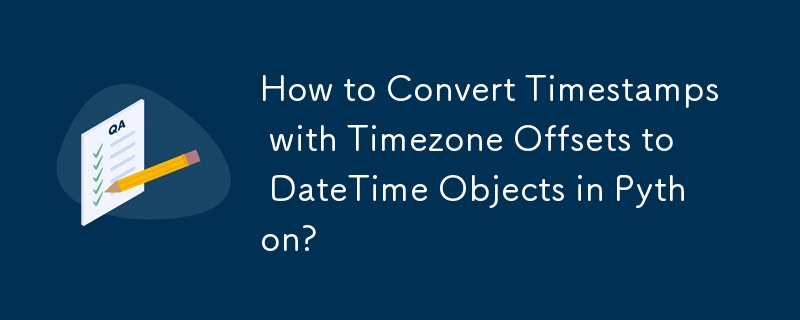 Backend Development
Backend Development
 Python Tutorial
Python Tutorial
 How to Convert Timestamps with Timezone Offsets to DateTime Objects in Python?
How to Convert Timestamps with Timezone Offsets to DateTime Objects in Python?
How to Convert Timestamps with Timezone Offsets to DateTime Objects in Python?

Convert Timestamps with Offset to Datetime Objects Using strptime
Problem
Converting timestamps of the format "2012-07-24T23:14:29-07:00" to datetime objects using strptime() can be problematic due to the time offset at the end (-07:00). Without the offset, it's possible to use strptime() as follows:
time_str = "2012-07-24T23:14:29" time_obj = datetime.datetime.strptime(time_str, '%Y-%m-%dT%H:%M:%S')
However, using the provided time offset results in a ValueError due to the 'z' directive not being supported.
Workarounds
There are two primary workarounds:
1. Ignore the Timezone Using strptime():
Remove the timezone portion from the timestamp before parsing:
time_obj = datetime.datetime.strptime(time_str[:19], '%Y-%m-%dT%H:%M:%S')
2. Use dateutil.parser:
The dateutil module offers a parse function that supports timezones:
from dateutil.parser import parse time_obj = parse(time_str)
Python 3.2 and Newer
For Python versions 3.2 and above, timezone support has been enhanced. %z will function after adjusting the format string as follows:
- Remove the last colon from the format string.
- Remove the '-' before the %z specifier.
time_obj = datetime.datetime.strptime(time_str, '%Y-%m-%dT%H:%M:%S%z')
The above is the detailed content of How to Convert Timestamps with Timezone Offsets to DateTime Objects in Python?. For more information, please follow other related articles on the PHP Chinese website!

Hot AI Tools

Undresser.AI Undress
AI-powered app for creating realistic nude photos

AI Clothes Remover
Online AI tool for removing clothes from photos.

Undress AI Tool
Undress images for free

Clothoff.io
AI clothes remover

Video Face Swap
Swap faces in any video effortlessly with our completely free AI face swap tool!

Hot Article

Hot Tools

Notepad++7.3.1
Easy-to-use and free code editor

SublimeText3 Chinese version
Chinese version, very easy to use

Zend Studio 13.0.1
Powerful PHP integrated development environment

Dreamweaver CS6
Visual web development tools

SublimeText3 Mac version
God-level code editing software (SublimeText3)

Hot Topics
 How to solve the permissions problem encountered when viewing Python version in Linux terminal?
Apr 01, 2025 pm 05:09 PM
How to solve the permissions problem encountered when viewing Python version in Linux terminal?
Apr 01, 2025 pm 05:09 PM
Solution to permission issues when viewing Python version in Linux terminal When you try to view Python version in Linux terminal, enter python...
 How to avoid being detected by the browser when using Fiddler Everywhere for man-in-the-middle reading?
Apr 02, 2025 am 07:15 AM
How to avoid being detected by the browser when using Fiddler Everywhere for man-in-the-middle reading?
Apr 02, 2025 am 07:15 AM
How to avoid being detected when using FiddlerEverywhere for man-in-the-middle readings When you use FiddlerEverywhere...
 How to teach computer novice programming basics in project and problem-driven methods within 10 hours?
Apr 02, 2025 am 07:18 AM
How to teach computer novice programming basics in project and problem-driven methods within 10 hours?
Apr 02, 2025 am 07:18 AM
How to teach computer novice programming basics within 10 hours? If you only have 10 hours to teach computer novice some programming knowledge, what would you choose to teach...
 How to efficiently copy the entire column of one DataFrame into another DataFrame with different structures in Python?
Apr 01, 2025 pm 11:15 PM
How to efficiently copy the entire column of one DataFrame into another DataFrame with different structures in Python?
Apr 01, 2025 pm 11:15 PM
When using Python's pandas library, how to copy whole columns between two DataFrames with different structures is a common problem. Suppose we have two Dats...
 How does Uvicorn continuously listen for HTTP requests without serving_forever()?
Apr 01, 2025 pm 10:51 PM
How does Uvicorn continuously listen for HTTP requests without serving_forever()?
Apr 01, 2025 pm 10:51 PM
How does Uvicorn continuously listen for HTTP requests? Uvicorn is a lightweight web server based on ASGI. One of its core functions is to listen for HTTP requests and proceed...
 How to handle comma-separated list query parameters in FastAPI?
Apr 02, 2025 am 06:51 AM
How to handle comma-separated list query parameters in FastAPI?
Apr 02, 2025 am 06:51 AM
Fastapi ...
 How to solve permission issues when using python --version command in Linux terminal?
Apr 02, 2025 am 06:36 AM
How to solve permission issues when using python --version command in Linux terminal?
Apr 02, 2025 am 06:36 AM
Using python in Linux terminal...
 How to get news data bypassing Investing.com's anti-crawler mechanism?
Apr 02, 2025 am 07:03 AM
How to get news data bypassing Investing.com's anti-crawler mechanism?
Apr 02, 2025 am 07:03 AM
Understanding the anti-crawling strategy of Investing.com Many people often try to crawl news data from Investing.com (https://cn.investing.com/news/latest-news)...





